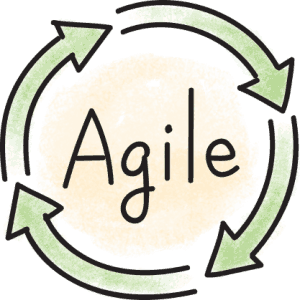Agile is essentially a model containing process groups run in a logical order within a defined period of time or “iteration,” and with a feedback loop to the customer for work or solution validation. The solution can be “discovered” or defined in detail through iterations that deliver functions and features of the solution. Thus, agile project management is an approach that leverages this iterative model to define and control the project work.
With Agile Project Management learning is built into the work and not assessed after everything is built. This is important when you have uncertainty in the project and need to “try different things out”. The principles of Agile have moved beyond their origins in efficient software development among teams, and deeper into business workflow management, productivity, and customer responsiveness, and this is especially true for the healthcare industry.
Agile Project Management offers practices and tools hospital leaders can implement to increase the quality of the care and optimize processes in a hospital. With Agile, the organization doesn’t need to know everything about everything up front. It just needs to have a general idea of where it wants to go and how it wants to get there. Agile Project Management enables an organization to hypothesize solutions, develop them, test them, make adjustments, and continue forward in an iterative manner until it achieves the desired outcome of improvement.
With this understanding allow us to share a conference paper from the Project Management Institute from some years ago that proved to be prescient, “Why convergence in agile and health care is driving the hottest Project Management jobs!” (Stenbeck, J. & Berthot, B.) “Where is the future going to be hottest for Project Managers?” The answer is at the convergence of Agile and health care systems implementation. That is true because regulatory and competitive pressure—worldwide—is driving pharmaceutical, health care, and medical device providers to find better, more comprehensive system solutions” [end].
This is further supported in a case study at the Journal of Modern Project Management titled, Organizational Agility, Project management and Healthcare Reorganization: (Louis Babineau, Lily Lessard), where it was concluded; “It is therefore reasonable to assert that change implementation can be facilitated through an agile type project approach insofar as its iterative development, validation, and adjustment process enable stakeholders to systematically consider the required adjustments. The use of an agile project management approach that systematically integrates stakeholder concerns and takes into consideration the inherent complexity of the healthcare system when defining and introducing new solutions appears more likely to result in successful organizational change when the focus is on managing the capacity of actors to change, rather than on managing an imposed change”.
However perhaps the clearest illustration of how well Agile is suited for the healthcare industry and the role of the Project Manager within the industry can be seen in a Powerpoint presentation, “The Healthcare Agile Project Manager” (Monica A. Wallace, PMP).
In response to the growth in adoption of Agile Project Management within the healthcare industry, PMO Advisory, a PMI® (Project Management Institute) Registered Education Provider and New Jersey’s leading project management training & consulting firm, is regularly delivering PMI-ACP (Agile Certified Practitioner) Certification Prep Courses. Courses are offered regularly at the PMO Advisory training center in New Jersey and to people everywhere live in a virtual classroom, instructor led online. Click here to learn more about our next scheduled courses.

